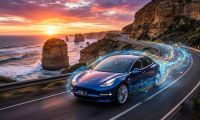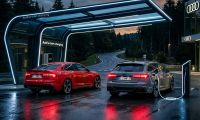As I reported last week, Kia achieved record breaking sales in October. However, hidden inside that positive news was a fact Kia wasn’t particularly inclined to emphasize: sales of their EV6 are headed in the wrong direction. Now, according to The Korea Economic Daily, “The two top Korean carmakers plan to increase the portion of hybrids until their EVs receive US tax breaks”. This makes it seem like the decline in Kia’s U.S. EV sales, and the EV6 in particular since there were almost no U.S. Niro EV sales to speak of last month, has an element of intentionality. This is surprising. We might otherwise have concluded that the sales declines were due to loss of the U.S. federal incentive (because the relative cost of the EV6 increased without it), or perhaps that supply just couldn’t keep up with demand. Apparently, that isn’t really the case and Hyundai and Kia are redirecting more of their EV production to other countries and regions. Maybe that is because they anticipate stiff headwinds in sales for their EVs without the incentives, or maybe it is for other reasons, but Kia had one of their worst U.S. EV sales months of the year last month, and now we have a good idea why.
To me this suggests that as long as Kia, Hyundai, and Genesis are ineligible for the federal incentive (which may not be that long), they are inclined to continue diverting some EV supply away from the U.S. market. As long as that turns out to be true, exactly how does that help Kia, Hyundai and Genesis achieve their electric vehicle leadership goals? It doesn’t, plain and simple. It means they will be far less likely to outsell other mainstream brands in the U.S. (i.e. not including Tesla) and they will cede market share to those brands that are still prioritizing the U.S. market. And how exactly does this help the U.S. achieve the emissions reductions goals of the IRA? Again, it simply doesn’t, or not in the near term anyway as it is now shown to be limiting the number of electric vehicles sold in the U.S. Maybe Congress intended a “no pain, no gain” approach to getting more EVs on the road while building out the U.S. manufacturing base to better support EV growth. That is possible, but I don’t think it is likely as according to electrek.com a new bill recently introduced by Congress, called the Affordable Electric Vehicles for America Act, would essentially restore the $7,500 tax credit for most manufacturers at least temporarily, if passed. The new bill would establish a phase-in period for battery sourcing and manufacturing requirements in the IRA that otherwise remove the incentive eligibility for most EV models and brands. Clearly, Congress has begun to realize their mistake, perhaps it was even pointed out to them by the Korean and European automakers, and they may soon take steps to rectify it.
What do you think? Are you upset or concerned about these trends and the decisions behind them? Would the increase in hybrid sales help assuage any doubts you may have about Kia and Hyundai’s commitment to lowering transportation related emissions in the U.S.? Please leave your questions or comments below.
Images courtesy of Kia and Hyundai.
Justin Hart has owned and driven electric vehicles for over 14 years, including a first generation Nissan LEAF, second generation Chevy Volt, Tesla Model 3, an electric bicycle and most recently a Kia Sorento PHEV. He is also an avid SUP rider, poet, photographer and wine lover. He enjoys taking long EV and PHEV road trips to beautiful and serene places with the people he loves. Follow Justin on Twitter for daily KIA EV news coverage.
Set Torque News as Preferred Source on Google











